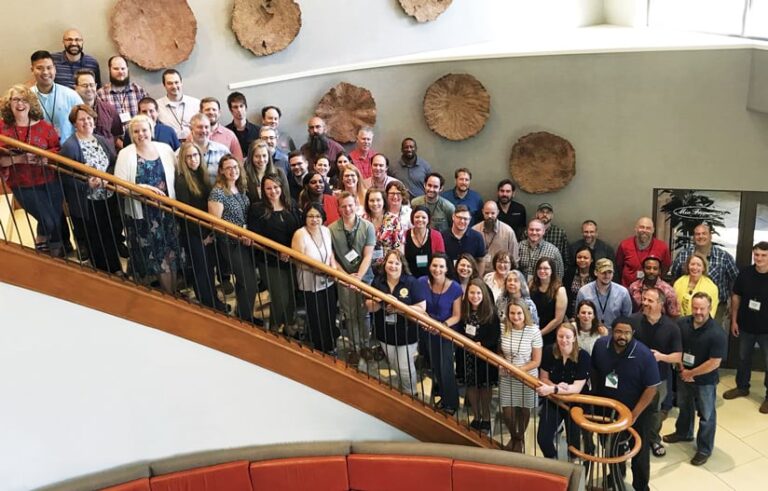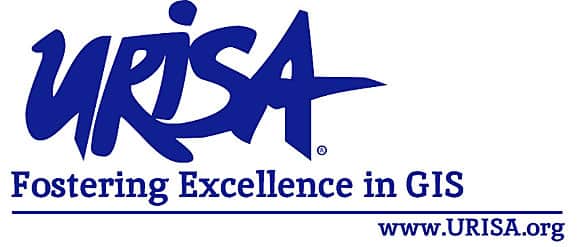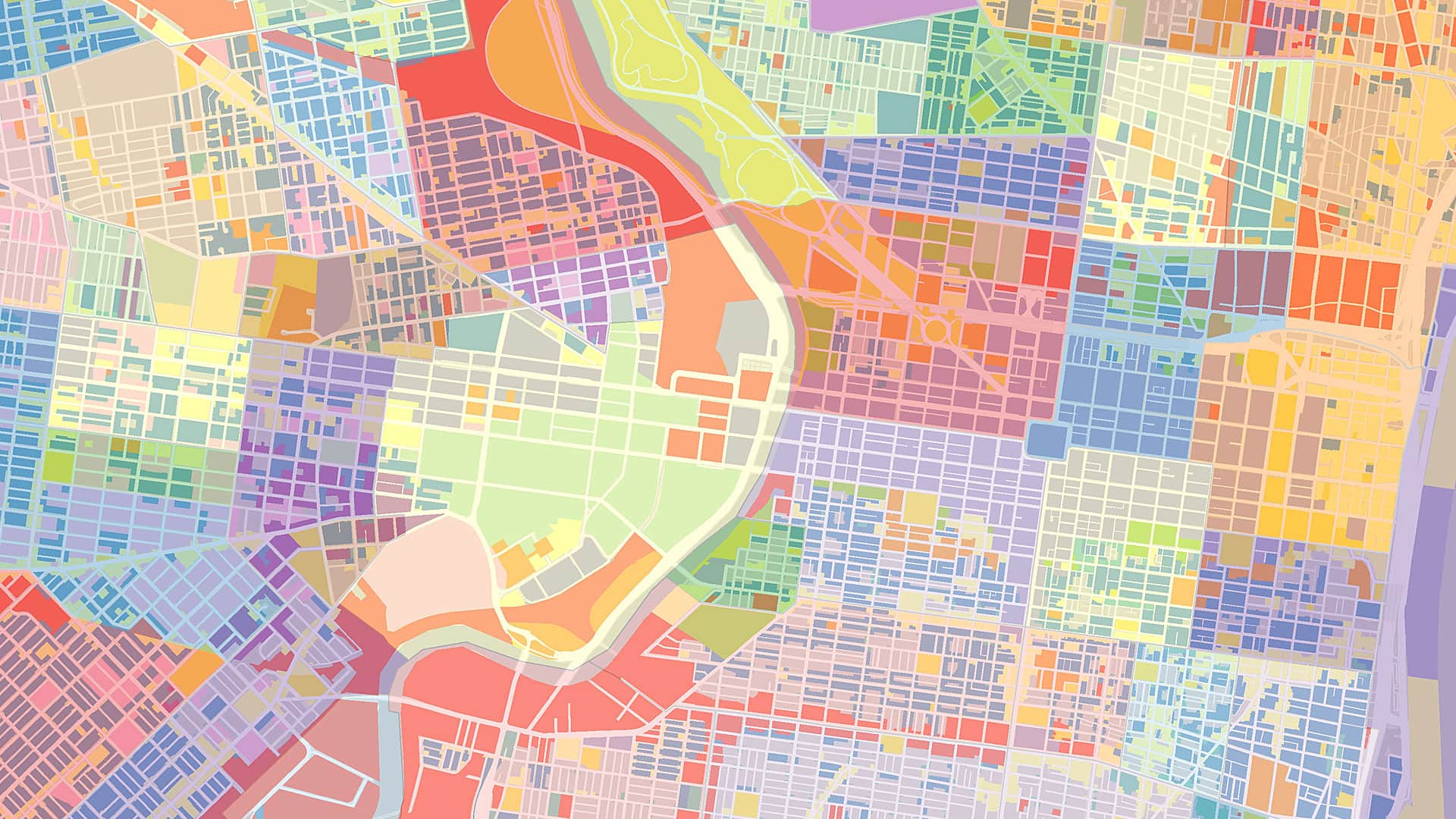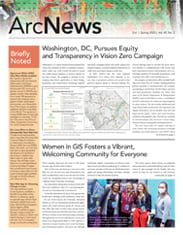The 21st century is bearing witness to massive advances in the scope, complexity, and impact of geospatial technology. Some might even call today the golden age of GIS.
To keep pace with the demands now put on geospatial industry professionals to come up with solutions to the world’s most pressing problems, many GIS programs need to revamp their management structures, systems, and procedures. The Urban and Regional Information Systems Association (URISA)—a nonprofit organization that provides education and training to a vibrant and connected community of geospatial practitioners in all phases of their careers—is doing just that.
URISA takes a holistic approach to the geospatial profession. The organization’s philosophy goes beyond teaching the technical components of GIS and takes seriously the need to develop well-rounded geospatial professionals who can have a tangible impact on the world.
The URISA GIS Leadership Academy, a first-of-its-kind program, addresses the increasing need for leadership in GIS by introducing participants to cutting-edge management practices. As one recent graduate, Micah Williamson, the engineering manager at i3 Broadband, noted, “After 20 years in the GIS business, this is the only training that I want.”
A Whole New Geospatial Learning Experience
The URISA GIS Leadership Academy—or GLA, as it is affectionately referred to—is a unique course that digs deep into the particulars of geospatial leadership. Over five days, participants learn management techniques related to GIS strategic planning, team development, organizational capacity building, financial sustainability, program investment and justification, resource allocation, change management, situational assessment, organizational performance evaluation, ethics, and problem-solving. Experienced GIS leaders teach GLA workshops that center on engaging, interactive discussions and team-building exercises.

The whole experience offers opportunities to delve into topics in a way that can’t be done at large conferences. It also gives participants the chance to critically evaluate their management practices. This rarely happens during the day-to-day grind of geospatial work since it tends to center on the technical aspects of the profession.
“Spending a week focusing on leadership and management that is just as critical as technical training [is] to your job, to your performance, to your ability to succeed at work—whether you are a manager or not—was [one] thing that really made it a valuable use of time,” said Aaron Cole, GIS analyst II for the City of Watsonville, California, who attended the GLA in Minneapolis, Minnesota, in December 2021.
Most GIS professionals haven’t formally studied management and leadership, so they typically learn on the job through trial and error. But when geospatial professionals lack strong leadership and management aptitudes, the quality, productivity, and impact of the technical parts of the field suffer.
The GLA educates participants—who range from GIS technicians to team managers—on the most current best practices in management, including crucial nontechnical skills, such as project management, strategic planning, and how to supervise people. Experienced instructors teach industry-standard methods, provide real-world examples, and conduct collaborative sessions that engage participants as they work through the challenges related to each topic.
Important Lessons That Affect Management Practices
In November 2021, the South Carolina Army National Guard GIS leadership team attended the GLA in St. Petersburg, Florida. The organization’s GIS program manager, Christy Jacobs, was astounded at how different her GLA experience was from other trainings she had participated in.
“At all the GIS conferences, you mostly learn technical skills—you learn how to use the new apps. But I [needed] to learn how to manage my people and projects better,” she said. “I [needed] to learn new ways of management and project tasking, how to interview people, [and] how to deal with difficult personalities and the generational divide.”
That’s what she explored at the GLA. And GLA alumni like her continually voice how important the course has been to their management practices.
Kaitlin Schrup, a GIS analyst for the Puyallup Tribe of Indians in Tacoma, Washington, attended the GLA in Minneapolis in 2021. Schrup was grateful for the deep conversations she got to have with the other experienced professionals in attendance—all of whom hail from vastly different sectors—about geospatial leadership and management challenges.
“My biggest surprise—and probably the biggest benefit of doing the GLA—was the amount of knowledge that I gained from my fellow participants,” she said.
Cole echoed Schrup’s appreciation of the networking and learning opportunities afforded by other participants.
“The attendees were…super engaged and really motivated,” he said. “[They] brought a lot of content and experience to the conversation.”
Alumni Feel Empowered to Try New Things
Time and again, GLA alumni reflect on how the workshop gave them the confidence they needed to change how their organizations operate.
The South Carolina Army National Guard, for example, was implementing pieces of project management best practices, but there were significant gaps. By encouraging South Carolina Army National Guard attendees to think critically about their organization’s management practices, processes, and procedures, the GLA helped them feel empowered to try new things and, eventually, fill those gaps.
A core component of the workshop focuses on how to better communicate with decision-makers.
“The aha moment for me…[was realizing] that GIS will continually need to be promoted—and to accept that,” said Schrup.
“Right off the bat, [the GLA] gave me some language to use that I really didn’t have at my fingertips before,” recalled Sara Hopkins, a senior GIS analyst for the City of Gresham, Oregon, who attended the Minneapolis GLA in December 2021.
The course content is geared toward giving participants real tools in areas such team building, conflict resolution, gap analysis, and change management that they can implement right away. Yet the GLA is more than the course content. It is an experience that gives attendees an opportunity to engage with peers from around the world, ranging from GIS technicians, analysts, and specialists to cartographers, program managers, and directors. The GLA empowers GIS professionals to go beyond technology and think about people. After all, at its core, GIS is about people.
Attend a GIS Leadership Academy
In 2023, URISA will hold two GIS Leadership Academy events. The first one will take place in Charlotte, North Carolina, June 12–16, and the second one will be held in Denver, Colorado, November 27–December 1.
For more information on the academies, visit the URISA GIS Leadership Academy web page. To find out how to join URISA, explore the membership options.




